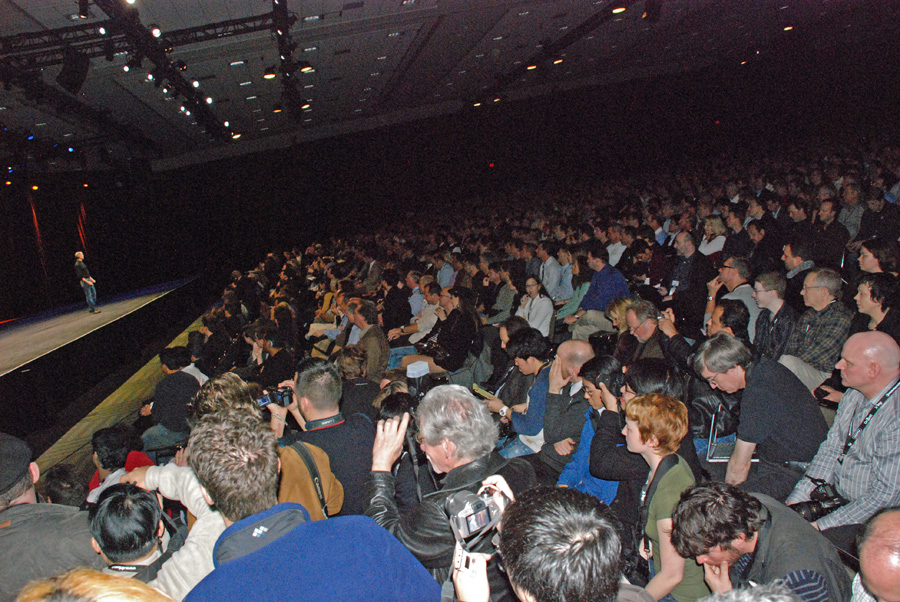 Steve Jobs died yesterday after a prolonged battle with pancreatic cancer. He was 56.
Steve Jobs died yesterday after a prolonged battle with pancreatic cancer. He was 56.
It’s sad when a vibrant man dies of cancer at the age of fifty-six, whether he is the C.E.O. of a multi-billion dollar company or just somebody’s father. Steve Jobs is no exception. Whatever one’s feelings about his life or his work, another human being has passed, and that is worth a moment of pause.
But as I read the lionizing facebook statuses and the glowing retrospectives recounting Steve Jobs’s life, I am puzzled by the emotional attachment to this man with whom few us had any real connection. I did not know Steve Jobs. I have never met Steve Jobs. He has had hardly any impact on my life beyond the iPod I purchased a number of years ago. Though his passing gives me a brief instant of sad reflection, I am otherwise largely unaffected.
Apparently, I am in the minority. And it’s not the first time.
Celebrity deaths tend to captivate the public consciousness. Even the President felt compelled to release a statement about the death of a public figure. There’s something that draws people in about the passing of someone who lived in the spotlight. Perhaps it’s because having watched or followed someone for several years gives an individual the sense that they know someone like Steve Jobs. The loss truly leaves a hole in their world. They feel as though they have lost a friend. This is a faculty that I apparently lack.
I found myself similarly staid when Michael Jackson passed away. I did grow up after his heyday, at a time when M.J. was more of a punchline than an icon. Nevertheless, I enjoyed “Thriller” as much as anyone, and I recognized his extensive influence on music and showmanship. Despite that, the frenzy after his death confounded me. I had no personal connection to Michael Jackson. Rather than feeling a personal loss at this passing, the extent of my concern centered on his young children, having to grow up without their father. I could only stand puzzled at the outpouring of emotion for a man few, if any, of the people praising him knew. The same goes for the response to the passing of Steve Jobs.
Perhaps it’s because I tend to scoff at what his company represents. Apple, to me, means style over substance. It signifies good marketing trumping true innovation. “Think Different” was not a visionary statement, it was a shallow ad campaign. Apple’s ad execs came up with it to put the best face on the company’s low market share in the personal computing sector.
They transparently attempted to justify weak sales by flattering their customers. They told the world that Apple users were “special.” They made their meager success in achieving consumer preference into a badge of honor and convinced their customers to do the same. It’s the same hipster mentality that has true believers superciliously decrying the unthinking slavishness of the mainstream, while blindly following their own pied piper and patting themselves on the back for their uniqueness and originality.
It’s also the same shtick peddled by everyone from Lady Gaga to Miracle Whip. “Liking us makes you a cool, forward-thinking, non-conformist.” (Just keep buying the product.) This from a company that eschews openness, rejects user freedom, and treats the products it sells as Apple property even after you’ve purchased them. If there’s one true innovation that Steve Jobs achieved in selling products like the iPad, it’s convincing people that buying high-priced electronics from a multi-national corporation makes you part of “the alternative.”
Yet, beyond the black turtleneck, beyond the “one more thing,” beyond the carefully crafted technoguru image, is a man who truly did help kickstart personal computing. He should be lauded for putting himself on the line for a product that he believed in. Afterward, he came up with a series of personal devices that, love them or hate them, captured the public’s imagination in a big way.
What’s more, he supported a brilliant company like Pixar and helped it to earn its sterling reputation. He made aesthetics, the merger of form and function, a premium in the world of consumer electronics. He saw the wave of digital music distribution and pulled his company into the forefront. He helped turn around a marginalized company and saw it achieve unprecedented success. For all this he should be commended and admired and, yes, even mourned.
But why the hero worship? Certainly Steve Jobs achieved some great things, and one’s life is often elevated in death, but why are we building a pedestal this high? Why do we feel the need to attach such great importance and such great personal attention to a man who meant little in any of our lives beyond a few nice toys? Whatever you think of the iPod, the iPhone, and the iPad, can they really be considered life changing?
For me the answer is no. I do not begrudge those who respond this way to the death of someone like Steve Jobs, but I would be lying if I said I understand. I admire Steve Jobs’s business savvy. I can appreciate and envy the geeky charisma with which he captivated a room. I recognize the creativity he brought to the world of technology. But in the end he was a stranger, a man I saw in video clips and article insets. My grief, my mourning, my feelings of loss, are reserved for people far far closer to me than the inventor of my music player.




5 Responses to Steve Jobs: It’s Hard to Mourn a Stranger